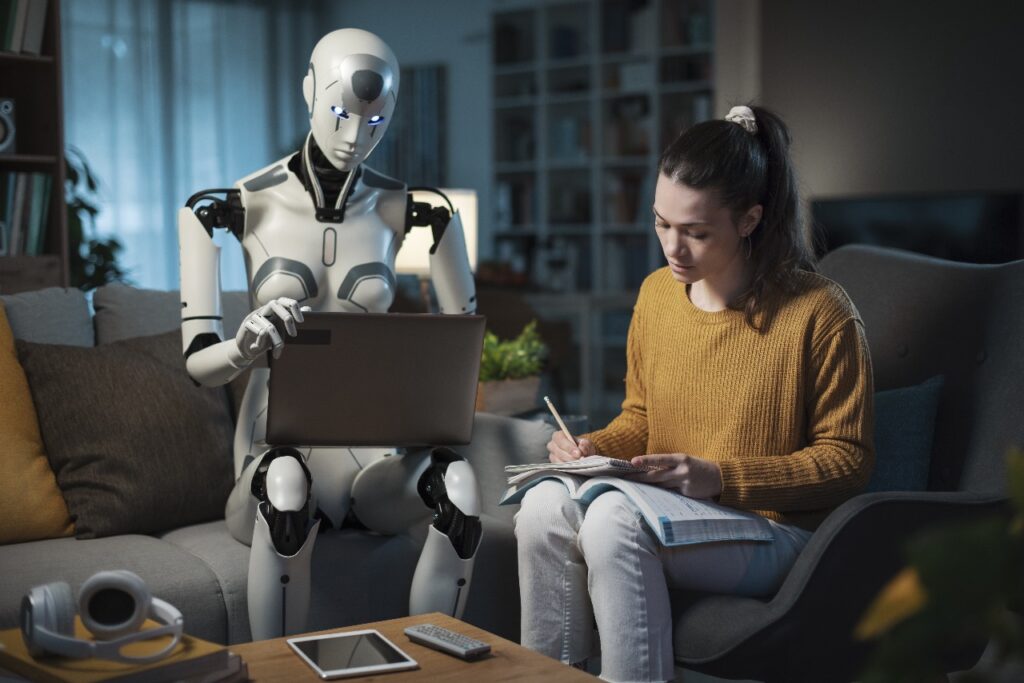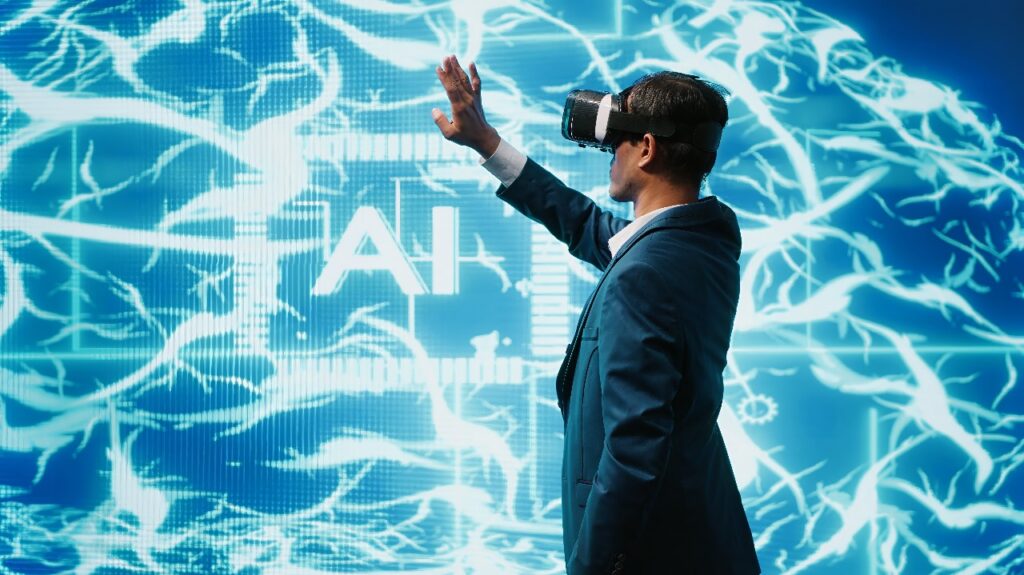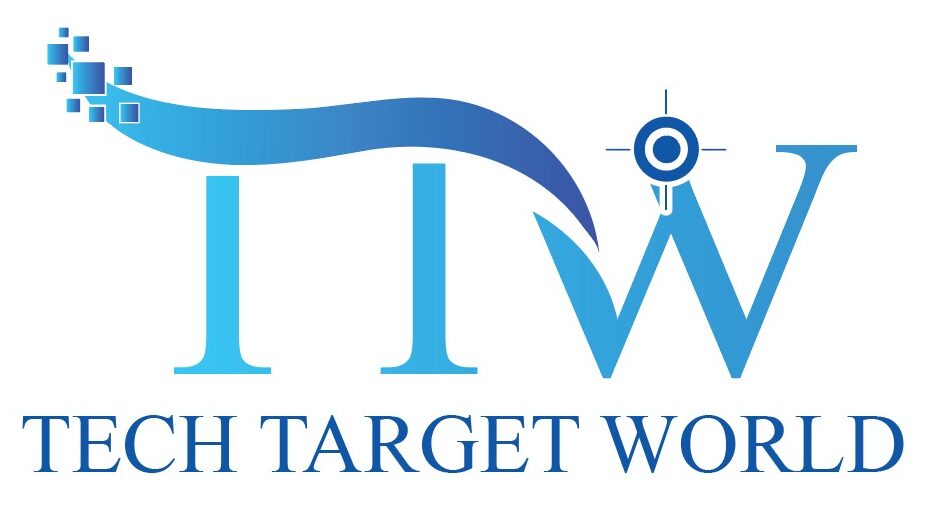AI has moved from just being imaginary science fiction to partaking in everyday life. Its transformative power is changing industries from healthcare to education to entertainment to transportation and reshaping even how we interact with the world as we understand it. At the cutting edge of technological development and advancement, it is at this time that the issues of ethics, governance, and implications of the new technologies must carry more weight than ever before. This article explores how AI is affecting our lives now, what tomorrow has in store, and how we might interact with this environment in the future.

Understanding Artificial Intelligence
They are creating systems and machines that cause behavior similar to human intelligence. It includes the learning from experience, pattern recognition, and decision-making capability of a machine. They may include everything from simple algorithms in a search engine to the most sophisticated neural network-based autonomous vehicles.

AI in Our Daily Lives
Artificial intelligence is, in fact, completely embedded into the fabric of our existence. Here are specific examples of how it is living up to change with respect to our lives.
1. Personalized Experiences
The online experience has been completely transformed by AI-based recommendation systems. Personal users are analyzed by these platforms by their choices and preferences in order to provide them recommendations such as Netflix, Amazon, and Spotify. It is simply making their lives a bit more convenient, making it much more satisfactory too.
2. Healthcare Revolution
There is a significant transformation underway by AI in healthcare. Machine learning algorithms assist in the early detection of diseases and also in the development of drugs. Let’s take IBM Watson, for example, which analyzes large volumes of data to search for cancer biomarkers. Robotic-assisted surgeries provide accuracy to surgical procedures and reduce recovery time.
3. Enhancing Communication
Increasingly, AIs, through systems such as virtual assistants like Siri and Alexa (chatbots), are serving as communication channels as well as barriers in making information available to consumers. These increasingly sophisticated systems can perform a variety of complex functions, such as scheduling, translating, and managing customer service.
4. Smarter Transportation
AI is responsible for transforming and incrementally changing the face of transport from one into something much greater. Mainly-from GPS navigation to the likes of ride-sharing applications to autonomous vehicles, most of the transport industry has embraced AI. Tesla is now creaming the top of the self-driving technology bar in altered functionality to cut down accidents and get all those times more efficient operation.
5. Education and E-learning
Education is changing and now includes AI as an element in adaptive learning systems that cater to different inseparably different needs of students. An example of artificial intelligence use in education is Duolingo, which creates personalized learning paths for improved accessibility.
The Promises of AI for the Future
AI has enormous potential and its future applications will bring benefits to multiple fields.
1. Advanced Medical Solutions
AI will revolutionize the medical field with innovations like:
- AI-driven gene editing and personalized therapies
- Predictive analytics is used to predict and prevent outbreaks of disease.
2. Sustainable Development
AI may provide assistance for sustainable development through resource optimization, environmental monitoring, and intelligent energy systems. Smart cities empowered by new magic powered by AI feature infrastructure that is environmentally friendly.
3. Enhanced Cybersecurity
AI-based security will play an ever-more significant role in identifying and addressing cyber threats as these risks further develop into real-time attacks.
4. New Frontiers in Creativity
AI-generated content systems-that compose music or even design-have opened up a range of new artistic possibilities.
5. Space Exploration
Through the AI, planets would be explored and all data retrieved from probes would be analyzed. It can even be an assistance to human colonies in worlds other than Earth.
Ethical and Social Considerations
It is not AI that is exceptional. The more power, the more obligation. Fundamental ethical and social questions arise with the rapid progress of the new tool.
1. Bias and Fairness
AI systems are trained on data until their unbiasedness between learning. The other major concern is addressing algorithmic bias in order to do any fair hiring, lending or law enforcement.
2. Privacy Concerns
Privateness is one of the most concerned factors as the use of data by AI is heavy. Finding a balance-the balance between individual privacy and innovation-is quite difficult.
3. Employment and Automation
AI-based automation can cause job cuts in industries such as manufacturing, and retail, but it will generate many opportunities for people working in the AI field. Nonetheless, future-readiness should take place for the change in the workforce.
4. Governance and Regulation
Rule of law governance, it would be argued, is needed to keep up with new changes in AI technology, but it must also be continued in responsible, transparent use in line עם societal values.
5. Human Dependency
Thou shalt maintain the control and analytical thinking of a human being to prevent the same from succumbing to a total reliance on A.I. as they continue to grow more important.
Actionable Steps for a Responsible AI Future
Take active measures by individuals, businesses, and authorities as follows to utilize the tremendous power of AI while reducing as many of its prospective dangers as possible.
1. Promote Digital Literacy
In particular, awareness of artificial intelligence, the uses of AI, and its possible impact prepares one to make informed decisions in the transforming environment.
2. Advocate for Ethical AI
It would do well for firms establishing artificial intelligence to make ethics a priority, building care and conscientiousness into the bisecting systems to prove social bearings.
3. Invest in Reskilling
For survival in an artificial intelligence-dominated world, the amenities must accentuate both education and training programs, equipping employees with the relevant techniques to succeed.
4. Develop Inclusive Policies
For survival in an artificial intelligence-dominated world, the amenities must accentuate both education and training programs, equipping employees with the relevant techniques to succeed.
5. Encourage Public-Private Collaboration
There can be joint development and co-implementation of artificial intelligence in a way that holds ethical and accountability standards.
The Road Ahead
As AI progresses, the effects of AI will be felt more and more through all aspects of life. It is also important to appreciate the advantages likely to be brought about by AI along with the possible hurdles it may create. This is by encouraging creativity, putting up ethical standards, and preparing societies to change that may arise with AI. We can ensure that its use shall be as a positive touch.
Admittedly, AI has a very broad potential in the future, whether it is health issues, combating climate change, or bringing an entire sector. AI’s transformative ability would essentially hinge upon our wise ability to maneuver its complexities for success.
Conclusion
Now, this artificial intelligence goes beyond advances in technology; it is also a power changing the course of human society. It is one of those things that has a prospective and absolute capacity to revolutionize industries, enhance the quotidian experience, and tackle global problems. This, of course, needs to have an ethical frame, be inclusive, and be carefully monitored.
As we stand at a momentous juncture in time, both as individuals and as a society, the decision-making we engage in now will define the application of this technology in our future. By allocating resources towards education, advancing ethical inventions, and anticipating societal change, we could direct AI more towards advancement than tumult.
For a brighter and fairer world where artificial intelligence might possibly do great things, it will be possible only through collaboration. We would build a future, therefore, with AI-solid foundations: intelligent, just, sustainable, and compassionate. Collaboration: create together a future where humans and machines flourish hand-in-hand for the greater good.

